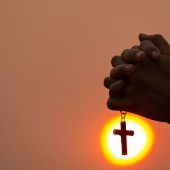Human imperfection and Divine Redemption

February 18, 2025 Tuesday of the Sixth Week in Ordinary Time
Daily Readings: Genesis 6:5-8, 7;1-5, 10; Mark 8:14-2
The Genesis flood narrative and Mark 8:14-21, though distinct, intertwine themes of human imperfection and divine redemption. Genesis 6 depicts humanity’s profound moral decay: “Every inclination of the human heart was only evil” (6:5), provoking God’s grief and judgment. Yet amid this corruption, Noah “found favor” (6:8), illustrating God’s unmerited grace. The ark becomes a symbol of renewal—a remnant preserved to rebuild a broken world. Here, divine justice and mercy coexist: sin demands consequences, yet God provides a path for salvation.
Mark’s account reveals a subtler but parallel human failing. After witnessing Jesus miraculously feed thousands, the disciples fixate on their lack of bread, missing His spiritual message. Jesus warns against the “leaven of the Pharisees and Herod” (8:15)—a metaphor for pride and worldly corruption. The disciples’ confusion underscores humanity’s chronic spiritual blindness: even amid divine revelation, human focus remains myopic, trapped in material concerns.
The Gospel bridges these narratives. Jesus embodies the ultimate “ark,” rescuing believers not from water but from sin’s deluge. Noah’s story prefigures this: physical salvation through the ark parallels spiritual salvation through Christ. Yet Jesus’ redemption transcends the flood’s temporary reset. His death and resurrection inaugurate an eternal covenant, transforming hearts rather than merely restarting creation. Where the disciples falter, Jesus offers patient correction, redirecting them from literal bread to the “bread of life” (John 6:35).
Both readings confront human frailty—Genesis through overt rebellion, Mark through distracted faithlessness. Both affirm God’s response: justice tempered with grace. The flood cleanses but cannot renew the heart; Christ’s sacrifice does both, offering liberation from sin and empowerment to discern truth. In Mark, Jesus’ rebuke—“Do you still not understand?” (8:21)—echoes God’s grief in Genesis, yet His resurrection answers humanity’s ancient plight with finality.
A Call to Action for Catholic Living: Trust in Christ, the true ark, who saves and transforms. Open your eyes to His grace and walk in faith.
Radio Veritas Asia (RVA), a media platform of the Catholic Church, aims to share Christ. RVA started in 1969 as a continental Catholic radio station to serve Asian countries in their respective local language, thus earning the tag “the Voice of Asian Christianity.” Responding to the emerging context, RVA embraced media platforms to connect with the global Asian audience via its 21 language websites and various social media platforms.














